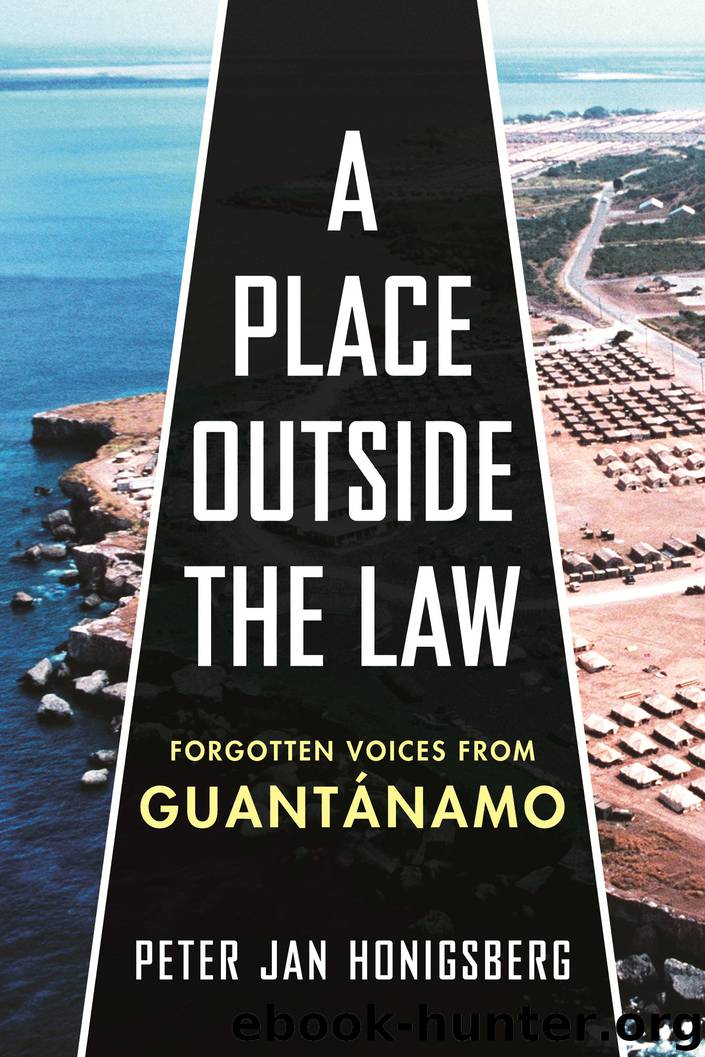A Place Outside the Law by Peter Jan Honigsberg

Author:Peter Jan Honigsberg
Language: eng
Format: epub
Publisher: Beacon Press
— CHAPTER 22 —
ALONE
Detainee Moazzam Begg of the UK was held in solitary confinement in Guantánamo for twenty months, one of the longest periods of isolation at the prison. He was held separately, in a section known as Camp Echo. He lived in half of a converted shipping container separated at the center by a metal divider. A metal bed, toilet, and sink were on one side of the cell. A table was on the other side. Begg and his habeas attorney, Gita Gutierrez, would sit at the table. The military added a tiny opaque glass window and air-conditioning to his cell just before Gutierrez came for her first visit in September 2004. Prison guards sat outside the hut, watching him.
At one point during the years before Gutierrez was permitted to visit him, Begg was literally banging his head against the walls. He asked for human contact. In response, the military sent him a psychiatrist. Begg described to us his conversation with her: “She sat on the opposite side of my cell, and she said, ‘Have you thought about hurting yourself?’ I said, ‘No, not in the way that you’re suggesting.’ And then she said, ‘Have you thought about removing your trousers, threading your trousers with a sheet, putting the crotched part around your neck so you can make a strong noose, and then tying it to the top corner of your cell and jumping off to commit suicide?’ I said ‘No, not until you put that thought into my mind.’”
Feroz Ali Abbasi was held for twelve months in isolation as an interrogation tactic. His cell was on the other side of Moazzam Begg’s metal container. Ali Abbasi was born in Uganda. At the age of eight, his family moved to the UK. Although he spoke some Arabic, his primary language was English.
At the beginning of his detention, he believed that he could “do with isolation better than others.” He described himself as not a very talkative person who could be quiet for long periods of time. In his early days, he believed that he could hold out against his interrogators and maintain his sanity by being mindful of at least one of his actions each day.
For example, one day he might focus his attention on his footsteps. He would observe himself as he placed one foot before the other while pacing back and forth in his cell, or while walking to the shower. Other times, he would try to control or be mindful of the pain in his toes. Concentration, he believed, would keep him sane.
As the weeks and months wore on, Ali Abbasi began to develop panic attacks. He explained them as being “like something is attacking me and I have to defend myself.” It was like having rational thoughts coextensively with less-rational thoughts. He tried to reason with himself—that nothing was there when he felt that something was attacking him. He could not convince himself. “I didn’t have control over my body,” he said.
During this time, the military medical personnel told him that they were giving him “immunization” shots.
Download
This site does not store any files on its server. We only index and link to content provided by other sites. Please contact the content providers to delete copyright contents if any and email us, we'll remove relevant links or contents immediately.
| Africa | Americas |
| Arctic & Antarctica | Asia |
| Australia & Oceania | Europe |
| Middle East | Russia |
| United States | World |
| Ancient Civilizations | Military |
| Historical Study & Educational Resources |
Lone Survivor by Marcus Luttrell & Patrick Robinson(746)
Where Men Win Glory by Jon Krakauer(706)
Operation Dark Heart by Shaffer Anthony(661)
Lone survivor: the eyewitness account of Operation Redwing and the lost heroes of SEAL team 10 by Marcus Luttrell & Patrick Robinson(590)
Dog Soldiers: Love, loyalty and sacrifice on the front line by Isabel George(505)
Ashley's War by Gayle Tzemach Lemmon(504)
The Finish: The Killing of Osama Bin Laden by Mark Bowden(495)
Lions of Kandahar by Rusty Bradley; Kevin Maurer(466)
Junger, Sebastian by War(462)
WAR by Junger Sebastian(455)
Jawbreaker by Gary Berntsen(422)
Lone Survivor The Eyewitness Account of(399)
A Place Outside the Law by Peter Jan Honigsberg(370)
Dog Soldiers: Part 1 of 3: Love, loyalty and sacrifice on the front line by Isabel George(331)
War Comes to Garmser by Malkasian Carter(317)
Callsign Hades by Patrick Bury(315)
My Journey as a Combat Medic: From Desert Storm to Operation Enduring Freedom by Patrick Thibeault(303)
War Against the Taliban by Sandy Gall(268)
